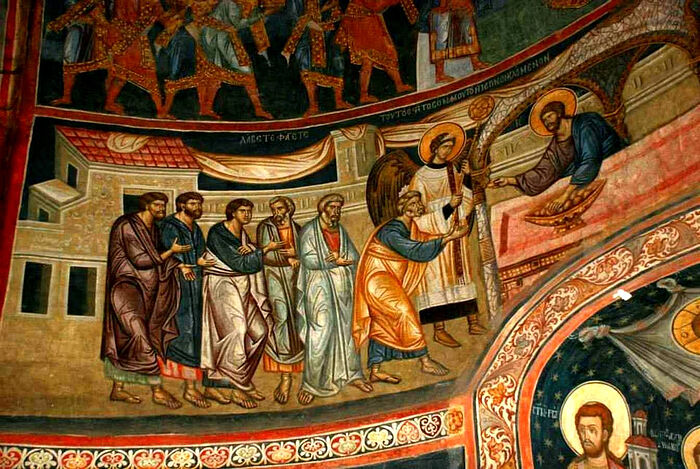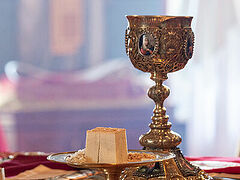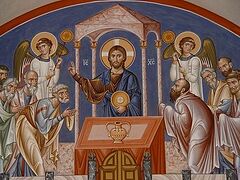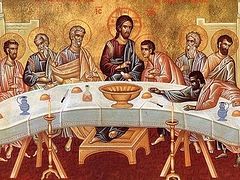 The Eucharist (Communing of the Apostles). Fresco in St. Nicholas Church at Curtea de Argeș Monastery, Romania. 14th C. Photo: fotoload.ru
The Eucharist (Communing of the Apostles). Fresco in St. Nicholas Church at Curtea de Argeș Monastery, Romania. 14th C. Photo: fotoload.ru
This do in remembrance of Me (Lk. 22:19).
We stand now before the Mystery of Mysteries, commemorating the great day of Holy Thursday—that day when the Sacrament of Holy Communion was established. Truly, this is a Mystery which the angels also desire to cling to with awe, but for which every boorish touch of the probing and investigating mind is an affront to the Sacrament. This is exactly what happened to the Jews when, for the first time, Jesus Christ proclaimed His word about the Mystery of Communion to them. It didn’t fit into their crude minds, as the ocean doesn’t fit into a vessel made by human hands; it seemed like blasphemy and sacrilege against God; it was even declared to be madness. And how true the word of Christ is eternally: It is the spirit that quickeneth; the flesh profiteth nothing (Jn. 6:63).
It’s not only in matters of religion that the flesh and carnal understanding profiteth nothing. The Mystery of Holy Communion is communion with God. He that eateth My flesh, and drinketh My blood, dwelleth in Me, and I in him (Jn. 6:56). But how can the human mind explain this communion with God if it can’t even comprehend the mystery it observes daily and hourly—man communicating with man? How, for example, is thought transmitted from one person to another? How can I share my feelings and spiritual disposition? How is the spiritual world of one man communicated to another? What is happening when I’m talking and you hear and listen to my words, you understand my thought, you take it to heart, assimilate it, and make it your own? This mystery isn’t comprehended by earthly sages, and if it doesn’t catch our eye, it’s only because it’s too common. How then can we understand the mystery of communication not of man with man, but of man with God? And hardly do we guess aright at things that are upon earth … but the things that are in Heaven who hath searched out (Wis. 9:16).
The Mystery of Communion is moreover a wonderful, incomprehensible change—the transfiguration of bread and wine into the Body and Blood of our Redeemer, given to the children of faith unto eternal life. Yes, it’s a mystery. But can the human mind boldly seek to comprehend it? Does it comprehend the mystery of life on earth? Does it understand how the universal material, unified in its substance, is transformed into the endless forms of the plant and animal kingdoms? How does life arise in dead matter? Let’s speak even closer, even rougher: How does ordinary bread or wine, received daily by man at table, turn into his own body, pass into his blood?
All of these are mysteries for the human mind, which must confess only that all these phenomena really exist; but how and why they happen—it can’t explain.
How can we comprehend the mysteries of eternal life, how can we comprehend the unseen world that surrounds us when we have neither the images and colors in our imagination nor the words in our language to speak about it, to understand it, and to represent it? Seek not out the things that are too hard for thee, neither search the things that are above thy strength. But what is commanded thee, think thereupon with reverence; for it is not needful for thee to see with thine eyes the things that are in secret (Sir. 3:21-22).
The flesh and carnal understanding profiteth nothing here. But the spirit gives life. What do the Spirit of God and the spirit of man tell us?
If you, brethren, were attentive to the Divine services of the holy and great days of the Fast, then you could and should have fixed in your soul one of the Church prayers very often repeated in the days of preparation:
Draw nigh unto us, draw nigh, O Thou Who art everywhere present: even as Thou wast ever with Thine Apostles, so also do Thou unite Thyself to them that long for Thee, O Compassionate One (Lenten Third Hour).
Do you feel that these words were poured out from the depths of the soul, as it were, of the entire human race? Do you see how they answer the basic ineradicable, spiritual desire of man to seek God, to enter into a union with Him, into a covenant, into communion? Man cannot be without God. If he doesn’t know the true God, he’ll ask, like the Jews asked Aaron: Make us gods, which shall go before us (Ex. 32:1). Under various forms, in idols, in crude statues, in sacrifices and incense, on mountains, in forests, adoring the things of the world, the luminaries of the heavens, the animal world, man has always sought God. He has called out to Him intently, wistfully, wearily: “Draw nigh unto us, draw nigh, O Thou Who art everywhere present.” And the fervent appeals of his faith and the anguish of unbelief itself with its disastrous fate all speak to how deeply rooted in man this desire for communion and connection with God is, manifested in all religions of the world.
What does Christianity—this most holy of all religions—teach us and what does it give us in this regard? Above all, it teaches and commands us that the Lord is near; it then brings God nearer to men until they are completely united in the person of the God-Man. But this isn’t enough. How will the sinner unite with the sinless One, how will the dry grass not burn as it approaches the blazing fire? In the mystery of redemption is the solution to the question; in the mystery of redemption, an eternal miracle is taking place: Man, who is straw, partakes of fire and is ineffably bedewed; the burning bush burns, a dry thorn bush burns but is not consumed [cf. pre-communion prayer of St. Simeon the New Theologian]. The God-Man redeemed the sinful world, broke down the barrier between Heaven and earth, brought man closer to God, and now: Glory to God in the highest, and on earth peace, good will toward men (Lk. 2:14); when the atonement was made, then we were given such closeness to the Lord of which man couldn’t even conceive, because he accepts into himself the very Body and Blood of the Savior and has Christ living in himself.
There can be no greater communion with God, no greater approach to Him. Here Christians, according to the word of the Apostle, become partakers of the Divine nature (2 Pt. 1:4). This is where we find the importance and deepest significance of this Sacrament, the establishment of which we now commemorate. We stand here before the very essence of our faith: Here is the mystery of human religious impulses, and the mystery of God’s love responding to them. This is why the Christian world is seized with horror if anyone blasphemes against this Mystery, this holy of holies of our faith, as the self-styled teacher of a new Christianity, the famous Russian writer [Lev Tolstoy] who excommunicated himself from the Church, dared to do in our days. Thus, in the days under the Law, everyone died, not only those who offended the sacred treasure—the Ark of the Covenant, but even those who touched it or simply looked at it contrary to the prohibition of the Law. That’s why even people of little faith, confessing their lack of faith in Confession, beg not to be excommunicated from the Lord’s Chalice. That’s why the dying forget everything, looking and waiting for a priest, longing to commune of the Most Pure Mysteries.
The Mystery is therefore a mystery because it’s accepted not by reason but by the way indicated by the prophet: If ye will not believe, surely ye shall not understand (Is. 7:9). It’s incomprehensible to the mind, but once accepted by faith, it meets all the deepest and eternal needs of our soul. Such are all the mysteries of the faith of Christ.
What should we do?
Great is the Mystery of Communion… It’s terrible to approach it, but it’s more terrible still not to approach it: It means to excommunicate oneself from communion and unity with God and eternal life. For it’s said: Whoever doesn’t eat of the Flesh of the Son of Man, who doesn’t drink His Blood, has no life in him. May these covenantal words not pass us by: This do in remembrance of Me! (Lk. 22:19). Let us renew this commandment of the Lord in our consciousness on this day of Holy Thursday, on this day of the commemoration of the establishment of the Mystery of the Body and Blood! Let those who are now preparing for it approach the Cup of Life. Let us approach it all throughout our lives; let us delve into its inner, deeper meaning with desire and faith, that we might draw nearer and nearer to God and ascend from strength to strength at a spiritual age. Taste and see how good the Lord is!
Amen.




